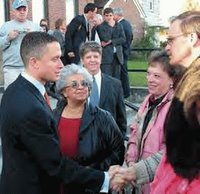 Michael Davis at the Chattanooga Times Free Press reports on Harold Ford's domination of the U.S. Senate race:
Michael Davis at the Chattanooga Times Free Press reports on Harold Ford's domination of the U.S. Senate race:U.S. Rep. Harold Ford Jr., D-Tenn., has out-raised his primary opponent, state Sen. Rosalind Kurita, D-Clarksville, nearly five-to-one this year.
With nearly a year left until the 2006 U.S. Senate general election, Rep. Ford said he will have enough money to run competitive primary and general elections and win.
"The same things I'll be saying to Democrats, I'll be saying to Republicans," he said. "The underlying thing is, people want change."
Rep. Ford had raised more than $2.1 million this year through the Federal Election Commission's third quarter and $3.1 million overall, a total that includes $1 million from his U.S. House campaign fund.
Sen. Kurita's fund-raising total in the third quarter was more than double what she raised in the second quarter. It put her campaign's total at more than $432,000. Andy Spears, spokesman for Sen. Kurita, said the campaign is happy with its direction. He said campaign officials are confident they will have enough money to buy television advertising before the Aug. 3, 2006, primary election.
"We knew going in when you run against a sitting member of Congress, you're not going to raise as much," Mr. Spears said.
U.S. Rep. Ford and state Sen. Kurita are running in the Democratic primary next year in the race to replace Senate Majority Leader Bill Frist, R-Tenn., who is not seeking re-election.
Republicans seeking the GOP nomination are former Chattanooga Mayor Bob Corker, former U.S. Reps. Ed Bryant and Van Hilleary, both R-Tenn., and Arlington, Tenn., resident Jeff Moder. This year, Mr. Corker has raised $3.85 million; Mr. Hilleary has raised $1.05 million; Mr. Bryant has raised $1.02 million ; and Mr. Moder has raised $5,050 this year, according to FEC records.
The primary winners will be on the Nov. 7 general election ballot.
Tennessee Republican Party Chairman Bob Davis said Republicans are confident they will defeat Rep. Ford if he is the Democratic candidate because his values are out of touch with many voters.
"He doesn't appeal to Republicans in this state. It's a conservative state," Mr. Davis said. "I do think it is a pipe dream if he thinks Republicans will vote for him in a general election."
Jennifer Duffy, an editor with the nonpartisan Washington, D.C.-based, Cook Political Report, wrote in an October analysis of the U.S. Senate race that "Ford, by virtue of his fund-raising strength and extensive travels around the state, is the clear front-runner for the nomination."
Dr. Bruce Oppenheimer, a Vanderbilt University political science professor, said in a Republican-leaning state that Rep. Ford will need the money he has raised to define himself if he is the Democratic nominee.
"Avoiding having to spend an enormous amount of money in the primary will be an advantage," Dr. Oppenheimer said. "He cannot afford to have himself defined by the Republicans."
Rep. Ford has spent about $1.32 million this year through the third quarter, while Sen. Kurita has spent about $196,000 this year, according to politicalmoneyline.com. The Web site showed Rep. Ford had $1.75 million cash on hand, while Sen. Kurita had about $236,500, through Sept. 30. In the GOP column, Mr. Corker's cash on hand was about $3.18 million, while Mr. Hilleary had about $842,000, Mr. Bryant had $714,000, and Mr. Moder had about $1,900 at the end of the third quarter.
Dr. Oppenheimer said Sen. Kurita's relatively low fundraising numbers thus far are detrimental to her campaign potential.
"Kurita has yet to be able to raise that money that will be necessary to make her a viable candidate," he said.
